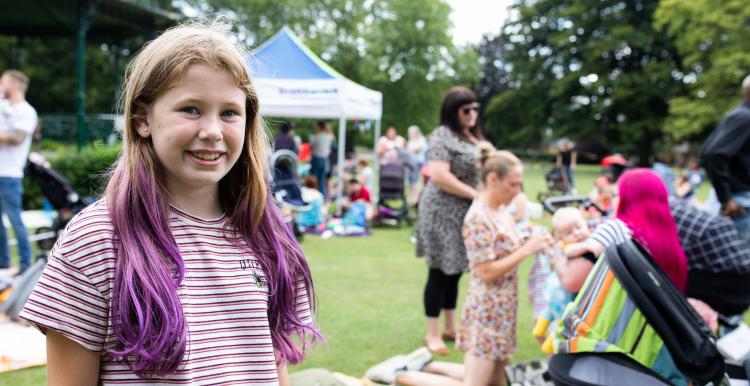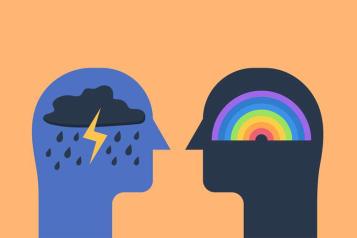Supporting a young person's mental health during COVID-19

It's always important to look after our mental health, as well as the mental health of our families. If you're a parent or carer of a child or young person, this can also affect your own mental health and wellbeing.
Although there is general guidance on supporting a young person with a mental health problem, the COVID-19 pandemic and resulting changes to our daily lives and routines may have negatively impacted you or you child's mental health. This article will give you some advice and information for supporting a child or young person and their mental health (as well as your own) during the crisis using advice from Public Health England.
Helping children and young people cope with stress during the pandemic
Here are some tips on how to communicate with and support you child during the pandemic:
- Listen to and acknowledge their concerns - children and young people may respond to stress in different ways; signs may be emotional (e.g. they may be upset, distressed, anxious, angry or agitated), behavioural (e.g. they may become more clingy or more withdrawn, or they may wet the bed), or physical (e.g. they may experience stomach aches). Children and young people may feel less anxious if they are able to express and communicate their feelings in a safe and supportive environment. Children and young people who communicate differently to their peers may rely on you to interpret their feelings. Listen to them, acknowledge their concerns and give them extra love and attention if they need it
- Provide clear information about the situation - children and young people want to feel assured that their parents and carers can keep them safe. One of the best ways to achieve this is by talking openly about what is happening and providing honest answers to any questions they have, using words and explanations that they can understand. Explain what is being done to keep them and their loved ones safe, including any actions they can take to help, such as washing their hands more often than usual
- Be aware of your own reactions - children and young people often take their emotional cues from the important adults in their lives, so how you respond to the situation is very important. It is important to manage your own emotions and remain calm, speak kindly to them, and answer any questions they have honestly
- Connect regularly - if it is necessary for you and your children to be in different locations to normal, make sure you still have regular and frequent contact via the phone or video calls with them. Try to help your child understand what arrangements are being made for them and why in simple terms
- Support safe ways for them to connect with their friends - they can meet outdoors (in private gardens or other private outdoor spaces) in groups of up to 6 provided they keep 2 metres (3 steps) apart from people outside of their household. Where this isn’t possible they can also connect online or via phone or video calls
- Create a new routine - life is changing for all of us for a while. Routine gives children and young people an increased feeling of safety in the context of uncertainty, so think about how to develop a new routine, especially if they are not at school
- Limit their exposure to media and talking about what they've seen or heard - like adults, children and young people may become more distressed if they see repeated coverage about the COVID-19 pandemic in the media. A complete news blackout is also rarely helpful as they are likely to find information from other sources, such as online or through friends. Try to avoid turning the television off or closing web pages when children or young people come into the room. This can pique their interest to find out what is happening and their imagination can take over. Instead, consider limiting the amount of exposure you and your family have to media coverage. Young people will also hear things from friends and get information from social media. Talk to them about what is happening and ask them what they have heard. Try to answer their questions honestly but reassure where you can
Helping a child or young person who is accessing mental health services
Children and young people with an existing mental health problem may find the current uncertainty around the COVID-19 pandemic particularly difficult. Their increased stress may lead to a change in their behaviours and their mental health needs. If you are concerned about how to access support if they need to stay at home, you may want to think about the following actions:
- Speak to their mental health team - contact them to discuss any concerns and check how care will continue to be accessed. Update any safety and care plans as agreed
-
Identify how the support your child or young person normally receives can be maintained - ask about having appointments by phone, text or online, and how their health professional can offer extra support if your child or young person needs it. If you usually have support in your home, check with your local authority or care provider what alternative arrangements are in place. Make sure it is clear if support is still needed for your child or young person
-
Plan how you will access medication - continue to order repeat prescriptions in your usual timeframe. There is no need to order for a longer duration or larger quantities. Your GP might convert your child or young person’s repeat prescription to one that is supplied under the repeat dispensing arrangements. This means you can go back to the pharmacy for a certain number of repeats without having to get a repeat prescription from the practice
Looking after your own mental health
As well as thinking about the children or young people in your care, it is important to take care of your own mental health and wellbeing. Children and young people react, in part, to what they see from the adults around them. When parents and carers deal with a situation calmly and confidently, they can provide the best support for their children and young people. Parents and carers can be more supportive to others around them, especially children, when they are better prepared. For more advice, please see our previous article.
If you need guidance on a specific mental health problem, you may find YoungMinds' A-Z parents' guide useful.

